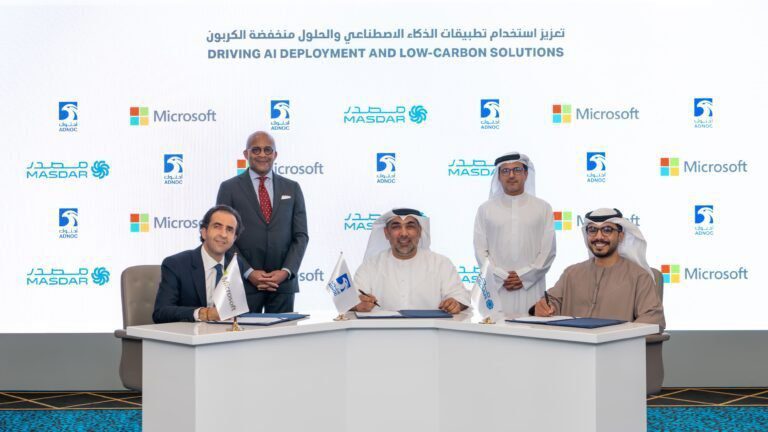ADNOC and Abu Dhabi Future Energy Company (Masdar) have signed a Strategic Collaboration Agreement (SCA) with Microsoft, aiming to drive AI and low-carbon initiatives in the UAE and internationally. The focus is on decarbonising the current energy system and enabling a sustainable energy future.
The announcement took place at ADIPEC in Abu Dhabi.
As part of the agreement, the companies will explore ways to power Microsoft’s data centres with renewable energy through Masdar, where ADNOC is a shareholder. They will also investigate AI applications to advance carbon capture, storage, and low-carbon ammonia and hydrogen projects. Additionally, the SCA will look into leveraging AI to improve efficiency across ADNOC’s operations, reduce methane emissions in line with the Oil & Gas Decarbonisation Charter, and enhance biodiversity monitoring.
Dr Sultan Ahmed Al Jaber, ADNOC’s Managing Director and Group CEO, emphasised AI’s potential to reshape productivity and progress, creating new opportunities for the energy sector. He noted that AI’s rapid growth could unlock long-term benefits, contributing to a sustainable future.
This agreement follows the release of the Powering Possible: AI and Energy for a Sustainable Future report, co-authored by ADNOC, Masdar, and Microsoft. The report, alongside discussions at the ENACT Majlis during ADIPEC, urges increased collaboration between the technology and energy sectors to harness AI in accelerating the energy transition.
Brad Smith, Vice Chair and President of Microsoft, stated that it is crucial to balance AI advancements with a sustainable energy transition, stressing the need for cross-sector collaboration. Mohamed Jameel Al Ramahi, CEO of Masdar, also highlighted AI’s key role in driving the energy transition and delivering clean energy to power future data centres.
ADNOC’s use of AI is instrumental in achieving its Net Zero by 2045 target and reducing methane emissions, with AI tools already driving significant carbon savings and economic value.


